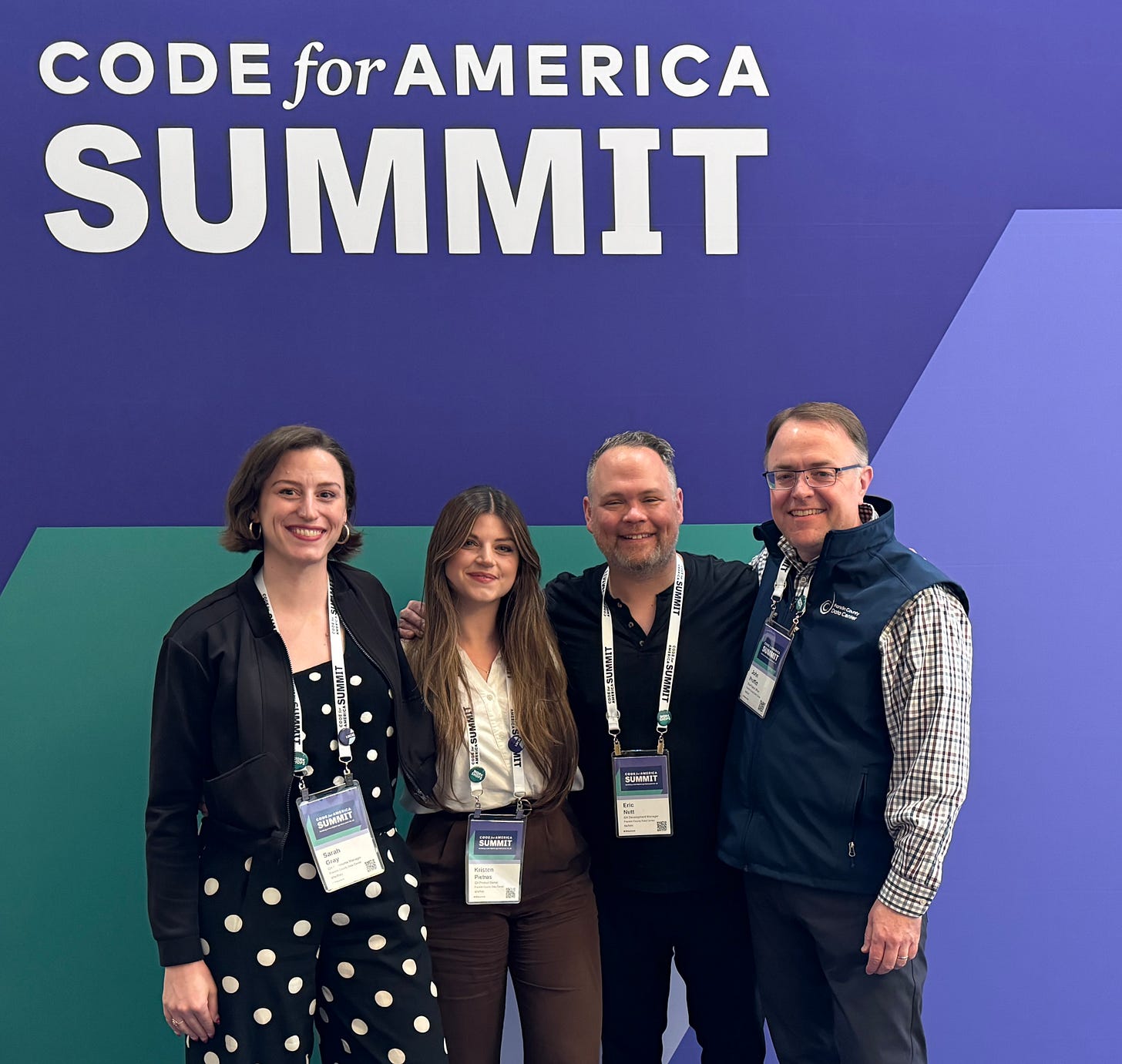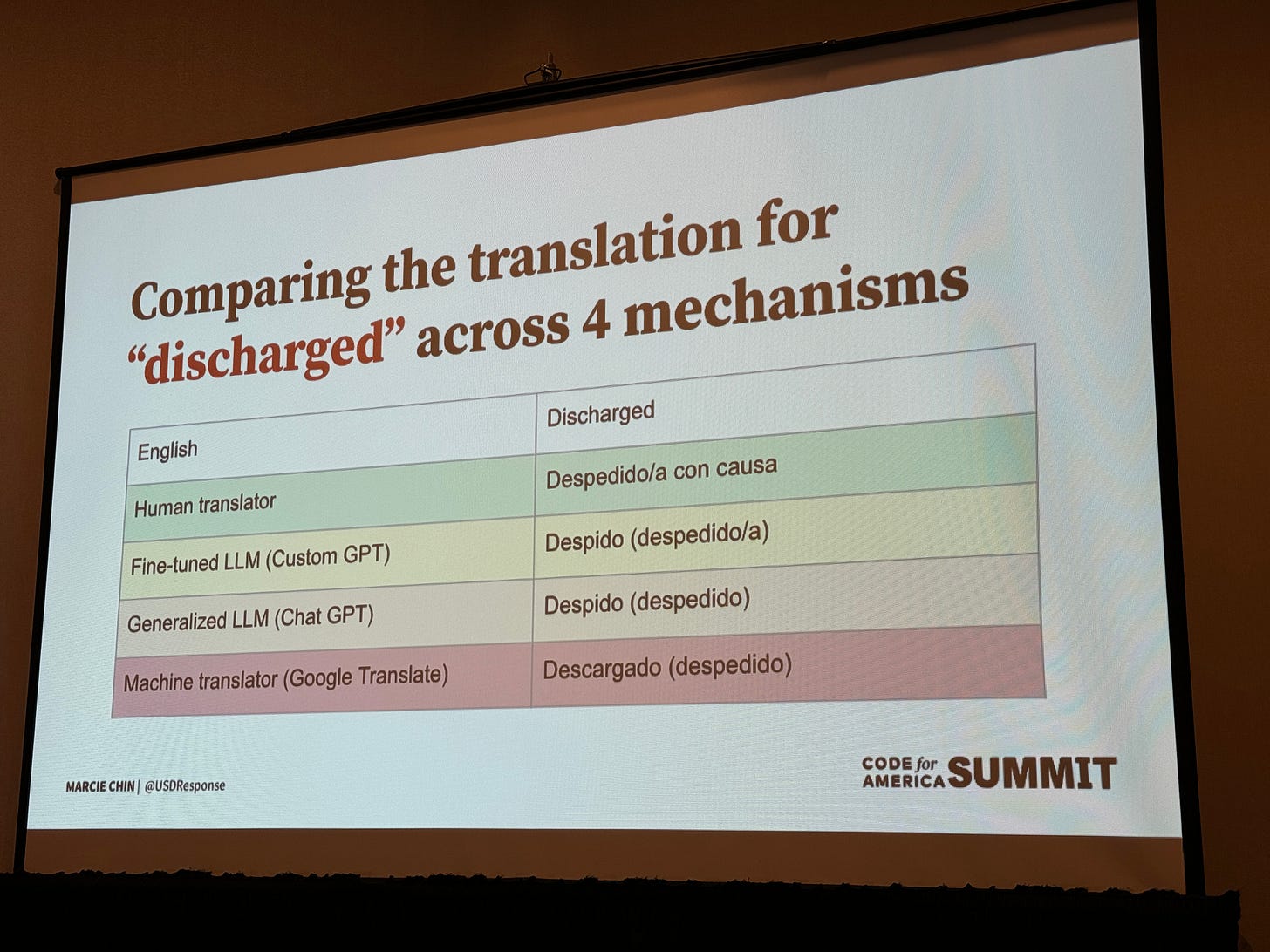Code for America Summit 2024 : Day 3
Impressions from #CfASummit in Oakland - May 30, 2024
Four of us from the GX Foundry made it out to Code for America’s annual Summit this week, and we attended all 3 days. We’re back in Ohio now, after a delayed red-eye flight on Thursday night into Friday morning. Below are some notes and thoughts from Day 3 (sadly our final day in Oakland).

Kristen
Day 3 of the Summit brought many insights into community-based research, engaging your users throughout the entire development process, and developing trust with your constituents. We discussed how imperative it is to put your users at the heart of it all — allowing your community to form the vision for the product or service you’re creating. Taking the time to really hear your community members, and meeting them where they want to be met, should be at the forefront of any work you’re doing.
During the last session of the day, How to Tame the Loudest Duck: Using Listening to Ensure Inclusion in Local Government, I genuinely shed a tear! Throughout the conference, folks kept mentioning the importance of having a North Star that guides the work you’re doing. Our speaker, who has been working to revitalize the city of Corona’s (CA) government space, shared such a heartwarming story about his mother’s path towards citizenship in the US. She was so excited to vote for the first time because she got to have her voice heard. His mother passed a few years ago, so she never got to see the wonderful work he’s doing to support his community, but he knew she would want him to give people a voice, and that’s the reason he tries so hard to have the members of his community inform every decision he makes.
Seeing so many people so passionate about helping others, and so passionate about fixing broken systems, was really inspiring.
Sarah
I really loved the sessions I went to on the last day of the summit because they were all pretty interactive and I got to have some good conversations with folks. I can be a bit of an introvert with an RBF, especially if I’m thinking about something or squinting to see, so not that many people come up and just start a conversation with me (and I don’t always have the social energy to do the same). So I appreciated the facilitators giving us this more structured opportunity to connect with each other.
I loved the session about winning hearts and minds with a design brief (by Cities Reimagined) - it was tactical while also giving us the storytelling ethos we all wanted.
The state of Utah’s CX team expertly facilitated a really engaging session that helped us all connect to the perceived barriers we put up for ourselves by allowing us a sticky note venting session first.
And I am truly jealous of the city of Corona’s storytelling. The maturity level of their community engagement and feedback loops were impressive. But how they’re using the data they collect to engage and improve the lives and communities of their residents is really inspiring.
Overall the #CfASummit was an incredible experience. It felt so good to be around hundreds of smart people who care about the same things I do, are experiencing the same difficulties, and hearing how they’re keeping people at the center of solutions.
Eric
The major theme for me on the last day of #CfASummit has been keeping things human-centered, whether it is for application design, providing services, or advocating for future change.
One session about human-centered design for a system shared across disparate government entities focused heavily on doing end-user research, specifically members of the public. Capturing the user experience helps to gather ideas for the preferred customer journey. I am also inspired to spearhead extending the user feedback function already in place on our new county home page onto other online applications.
Another session discussed the roadblocks Customer Experience (CX) teams face within their government institutions and how to navigate around them. I was thrilled to be able to share with the session our own challenge involving being told something was in Ohio Revised Code (our state law), so I kept asking for several years until I got a different answer.
My final session of the day involved the equity in providing government services to immigrant and refugee communities who speak little or no English. This is something I would like to keep in mind as our own local government provides services to many immigrant groups.
John
Paying for research
The “Community-driven product management” session with folks from Seattle was great, although it struck me it was more about user research than product management (of course those are tightly interlinked when done well). But one theme came through loud and clear: pay people for participating in research.
That idea—paying folks for their time and opinions—has come up in multiple sessions over both days. Everyone getting meaningful research done is doing it this way. But we’re betting that may not go over well back home. So we’re already thinking about how to get around likely resistance in the County on this front. County leaders don’t even know what “user research” is, so hitting them with the idea of paying residents directly for that research might get a lot of raised eyebrows.
We believe we may be able to solve this problem by hiring outside firms to coordinate research work, and those third parties would pay research participants, keeping government away from actual payments (and any perceived political implications). We’ll just have to put that into the contracts with third parties.
Fixing systemic failure with actual intelligence
Fellow Beeck Center CDSO member Julia Gutierrez gave a great presentation on her efforts at the city of Boston to vastly improve their 311 services and build more trust with the community. She’s contending with spaghetti code assembled over many years and a contract started long ago with a third-party vendor that spent 3 years building something that was never going to work (which sounds hauntingly familiar).
Julia did a great job, but what I loved about her presentation more than any other I’ve seen this week were 3 things:
She was done with the core presentation in 30 minutes, which was plenty of time to cover her topic despite being complex
This left 30 minutes for insightful questions from the audience, which are awesome—these rooms are full of smart, dedicated people and their questions often illuminate the topic in new ways
The questions also illustrated Julia’s absolute command of the topic and her confidence in leading the solutions to come; I suspect some presenters fear the unpredictable Q&A, but she killed it
My takeaways from the 311 talk?
Build iteratively and quickly.
Stay agile, stay lean.
Get the resources you need to lead and organize your team well. Under-resourced teams are not a badge of honor and will hobble your ability to serve the public and your agencies. (And the agencies want you to succeed.)
AI for government translation
This is a complex topic and there are conflicting perspectives here at the Summit. Kristen attended a 3-hour workshop on Tuesday that was pretty down on AI for translation. But Lord knows we need help in this area, and may need to consider our options to do the most possible good for the least effort.
I attended this last session to learn what New Jersey has done with generative AI to assist with translations for Unemployment Insurance specifically. Remarkably, they took a very balanced, thoughtful approach, with key help from Marcie Chin at USDR.
In short, the approach described compared translations across different AI models and always included some human review. And they did indeed find differences along the way…
But what about the source UI documents?
What no one addressed, however, is whether the source documents and policies have been properly re-written into plain language first. Maybe that was done? Maybe not? But it wasn’t clear.
Honestly, it seems like we should probably use AI and some human writers to translate Government English to Plain English first, then try the Spanish translations (also with human correction).
Still, the good news in all this is that with a trained / tuned AI model the translation work can be sped up considerably. Research is still required. Human translation is still required. But if you imagine the billions of words generated by governments across the country, getting some help from AI makes sense.
And allow me to be clear: I accept AI tech when it comes to language processing because that’s what it was engineered to do — algorithmic / predictive text completion based on a tunable corpus of input material.
It’s still not perfect! It’s still not going to take over the world! But for text processing, sure… pull this tool out and use it. With supervision.
And that’s it for our play-by-play comments on Code for America’s 2024 Summit. It’s been a great experience and we are jazzed at the notion of attending again next year, if possible.
Check out our notes and comments from the other 2 days of the Summit:








@JohnProfitt
THIS!!!!
"Under-resourced teams are not a badge of honor and will hobble your ability to serve the public and your agencies. (And the agencies want you to succeed.)"
I wore many hats during my time at FCDC, but my #1 goal was to help Eric get the right talent in the right places when we could, (budget. This is so that we could expand our Customer experience capabilities.
I am so glad you have a tight team now with UX talent. It will and is already making a huge difference in your web presence. I am still interested in joining the team. Good Luck!